Domain is the most important element that contribute in the organic success of the website. Domain is not just a website address, but it is an address that communicates and represents the purpose, niche, and overall content of your website and brand.
This is not just a word or combination of words and a fancy extension; this is what people and search engines think about the website and brand.
So, what is a domain? Technically, a domain is a website address that is used to access web pages and websites in a browser. But from a marketing perspective, this is a word of representation of your website and business.
That is why it is important to pick a good domain for a website and business. But there are certain traits behind a good domain, such as being memorable, short, easy to spell, and SEO-friendly.
So, how do you choose the best domain that is not only easy to spell, memorable, unique, brandable, and SEO-friendly but also represents your business differently among competition?
Top 5 SEO tips to pick a good domain
All of this and more, we will discuss in detail how you can pick a good domain for your business, blog, personal portfolio, event, and tools-based website.
1. Choose the domain words related to your target audience
Until you define your target audience, including their daily life, problems, desires, and the vocabulary they use during voice and keyword searches and communication in general, you will not be able to think of and find words related to your target audience.
Once you know this, you should incorporate words that are most relevant to your target audience. Below are some examples of popular websites and how they have included words, keywords, and search terms related to their target audience when choosing their domain names.
moms.com – Moms.com directly appeals to its target audience by incorporating the term “moms” in its domain name, indicating that it provides content and resources specifically focused to mothers seeking advice and support in parenting. See the organic traffic screenshot below as tested on the SimilarWeb.com
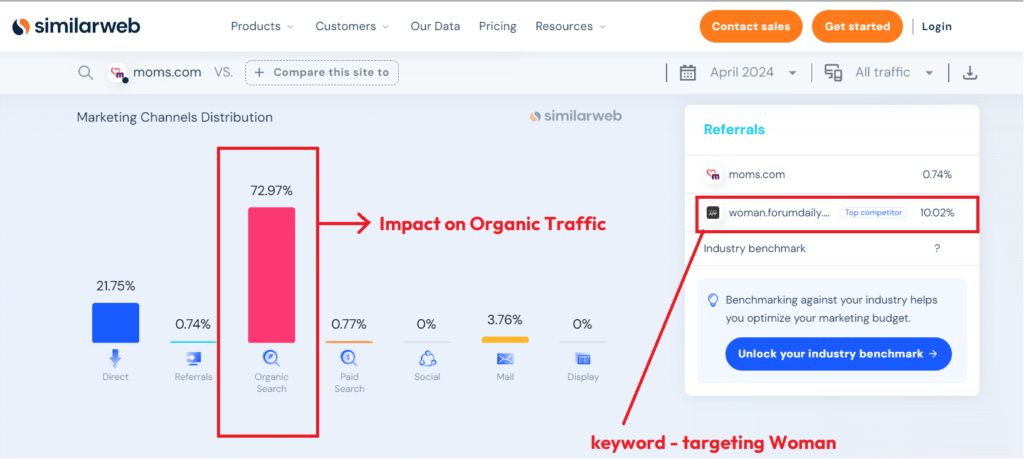
TripAdvisor.com – TripAdvisor includes “trip” to directly target travel enthusiasts, enhancing its SEO by appearing in travel-related searches. This relevancy boosts organic traffic, as users trust and click on a domain that clearly aligns with their travel needs. See the organic traffic screenshot below as tested on the SimilarWeb.com
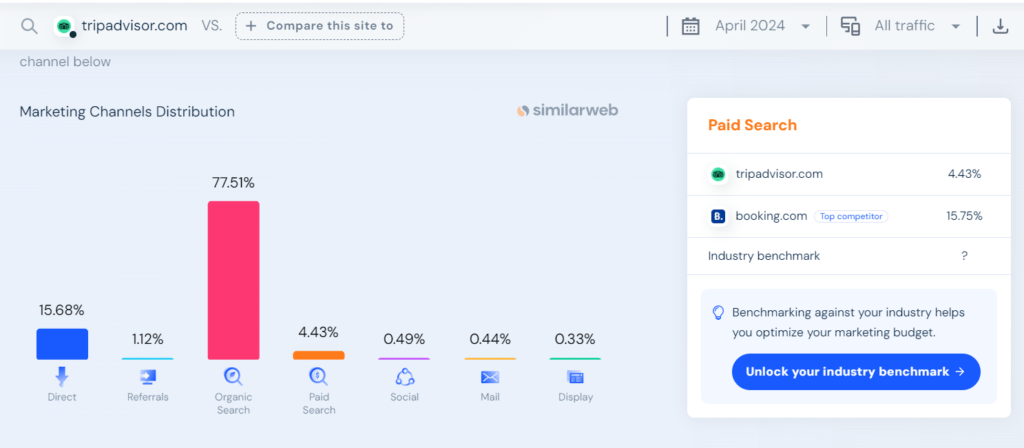
Things to remember:
- Adding target audience-related words to a domain name improves SEO, enhances instant recognition, builds trust and credibility, increases memorability, and strengthens branding.
- Just adding target audience-related keywords to the domain isn’t enough and guarantee for organic traffic. The other ranking factors such as good content, website design, and user experience are also matter and more important in 2024 and beyond.
For example, simply putting ‘Tasty Ice Cream’ on a shop hoarding is not enough unless you provide actually tasty and delicious ice cream at a good price and fast service.
So consider your target audience and their search phrases while choosing and researching for domain, but this is not the only option.
2. Research on keyword
Keyword research plays a most important role in SEO and digital marketing by optimizing content and web pages to align with user search queries, this will increase visibility and attracting relevant organic traffic.
This optimization begins with selecting a domain, where integrating keywords related to your industry, niche, content, and trending terms can significantly showcase relevance to search engines, potentially leading to higher rankings and more targeted organic traffic.
See some of the best examples below, how these companies smartly integrated keywords in their domain name and you can see how popular they are today:
Booking.com: Used the search terms Booking, refers to the process of reserving accommodations, flights, or other services.
See the keywords example related to this: According to the Google Keyword Planner research, the keyword “book a hotel in India” has been searched between 100 to 1K times per month on Google search engine over the last year.
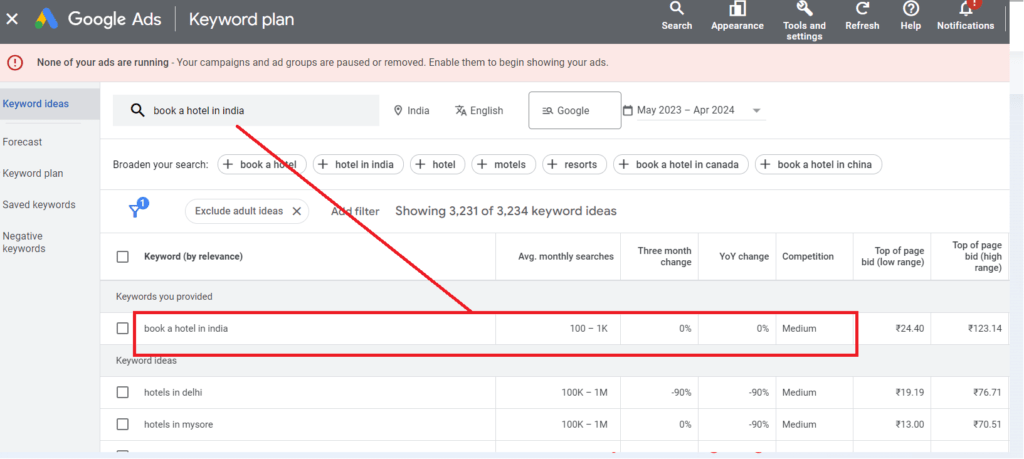
Now, let us examine an example where Booking.com is ranking for this search term. You can see that it is on the third search result, getting organic and unpaid traffic.
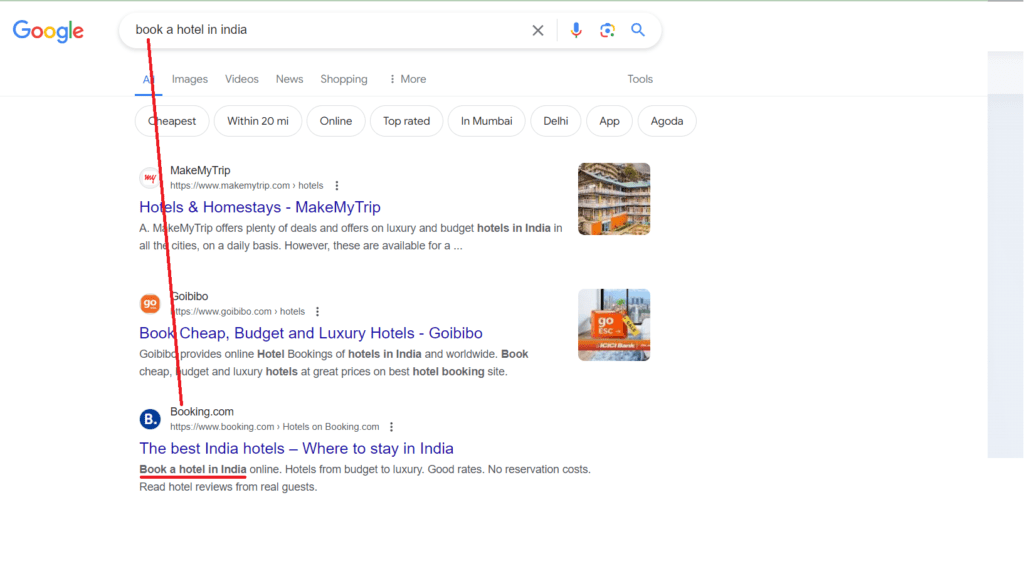
By including the keyword “booking” in the domain “booking.com,” the website becomes closely associated with booking accommodations, making it more likely to rank higher in searches for terms like “book a hotel” and attract organic traffic.
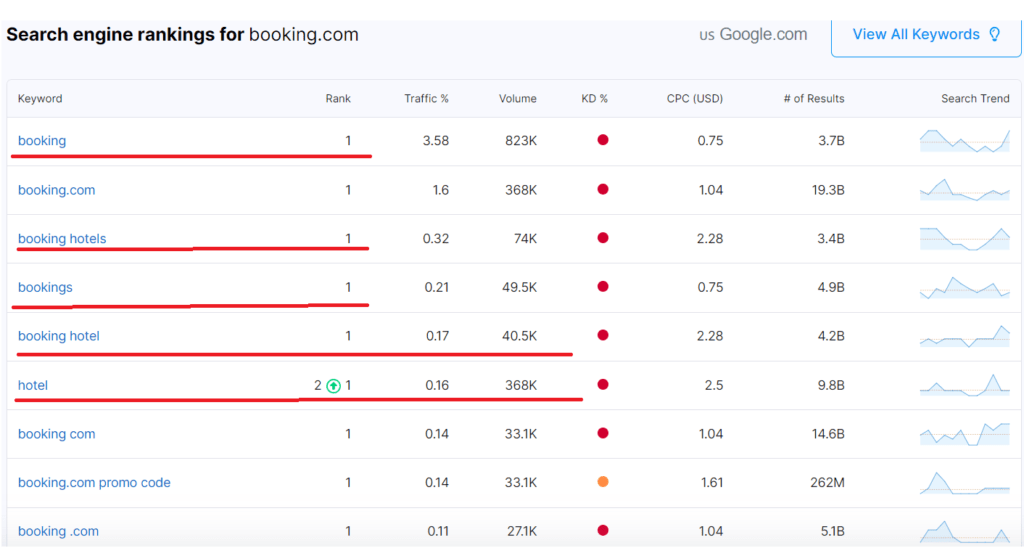
- WPBeginner.com: Included “WP” for WordPress niche.
- Martech.org – combines Mark for marketing and Tech for Technologies.
- ContentMarketingInstitute.com: Combines “content marketing” with “institute.”
So, by adding relevant keywords strategically in domain can have a significant impact on SEO. Keywords help search engines understand the content and purpose of website, web pages, making them more likely to appear in search results when users search for those keywords.
But still, it is just one aspect; other factors in getting organic traffic or improving SEO are also important to consider—not just the keyword in the domain.
3. Make it memorable

Whether your domain contains keywords or target audience phrases, if it is not memorable or if people cannot remember your website, it will not significantly contribute to your website’s SEO or to achieving organic and direct traffic.
Therefore, even if you cannot include keywords or match audience phrases, the domain should at least be memorable. To make a domain memorable, you can include keywords, unique word from dictionary, any trending word, and with new domain extensions such as .world, .io, .designer, .live related to your website’s category, services, or products.
The .com domain extension is the most popular and widely accepted, but there are now many unique and specialized domain extensions available. These new extensions can be used to your specific needs, product and services such as using your name and profession or business, for example: Vijay.Designer, computerclasses.online, techsupport.live, etc. These personalized domain names can make your website stand out and clearly convey its purpose as well as make it memorable.
You can also give it unique touch but try to avoid using numbers or any special corrector -, numbers etc. If in other case if your business is related to something in which number can make positive and memorable impact such as 24 for twenty, 7 for week etc.
4. Make sure it is short

Short domain names are more memorable. However, using more than 10 characters or exactly 10-character keywords in the domain can have a negative impact. It is important to ensure the domain is short and memorable, not just based on keyword length.
Most domains with five characters or fewer are already taken or come at a higher cost. In such cases, you can use new domain extensions such as. world specific to your business or country extensions like .in, .us, if your website, blog, or business targets local or national communities.
5. Avoid misspelling words in the domain

Intentionally, to make a domain unique, we try to add misspellings 1 or 2 character. While this can occasionally work and make the domain memorable, it often causes issues. When people search for your website on Google, Bing, or other search engines, these engines may correct the spelling or notify users about the correct spelling.
As a result, other websites with the correct spelling might appear in the search results instead. This is why it’s important to use the correct spelling of words in your domain. For example, my own domain had a misspelled keyword. The correct word is “client,” but I used a different spelling.
My own website domain serves as an example. Initially, I used the incorrect keyword “klient” instead of “client” due to some reason, causing issues. As a result, the domain/business not benefited from word-of-mouth marketing until my domain gains significant popularity.
That’s why this is important but along with this it’s important that we don’t do something that is technically right, but professionally and verbally that don’t’ suite to website or not easy for target audience.
The simple formula is that the domain is ultimately for the target audience, not just for our own preferences or personal likes and dislikes.
Tools helpful in picking up good domain name
1. Keyword Research Tools
Keyword Research Tools like Google Keyword Planner, Semrush, and Ahrefs will help you to identify the popular and relevant keywords related to your business and niche. You can include those keywords in a domain name for SEO friendly and relevant domain name.
2. Domain Name Generator
Domain name and business name generator websites, such as DomainWheel.com, businessmaker.com suggest domain and business names based on your keywords and business focus. By entering keywords discovered through keyword research tools, you can find a suitable and available domain name
3. Viral social media # Tags
Viral social media tags are the words in which related topic/news/content become viral. You can use these popular # hashtags trending on platforms like X and Instagram. You can get inspiring ideas for domain names based on current trends and attract immediate attention.
4. AI tools
AI is slowly but surely transforming every aspect of business, including domain name generation. AI-based tools like Namy.ai and Atom.com can help you generate good domain name ideas efficiently.
5. Google Trends
Google Trends shows the popularity of search terms over time. These trends help you identify trending keywords or search terms people are using on Google, which can be included in your domain name.
6. Domain Booking Websites
Platforms like GoDaddy and Namecheap where you can search for and register domain names. They provide you tools to check domain ideas, availability and secure or book your chosen domain name.
So, by understanding your target audience, keyword research, ensuring memorability, keeping the domain short, and avoiding misspellings, you can get good, unique ideas and create a good domain name for your business or website.
And utilizing tools like keyword research tools, domain name generators, AI tools, and Google Trends can further aid in selecting an effective and SEO-friendly domain.




